
The Wyoming Military Department is part of the Government of Wyoming. Its primary components are the Wyoming Army National Guard, and the Wyoming Air National Guard.

The State Partnership Program (SPP) is a joint program of the United States Department of Defense (DoD) and the individual states, territories, and District of Columbia. The program and the concept are entirely new, originating in 1993 as a simplified form of the previously established (1992) Joint Contact Team Program (JCTP). The JCTP aimed at assisting former Warsaw Pact and Soviet Union Republics, now independent, to form democracies and defense forces of their own. It featured long-term presence of extensive and expensive teams of advisory specialists. The SPP shortened the advisory presence to a United States National Guard unit of a designated state, called a partner, which would conduct joint exercises with the host. It is cheaper, has a lesser American presence, and can comprise contacts with civilian agencies. Today both programs are funded.
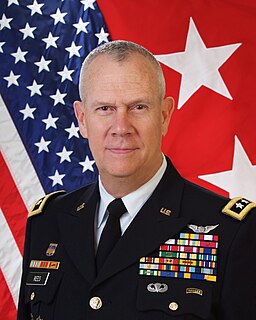
Major General Raymond F. Rees was Deputy Assistant Secretary of the Army for Training, Readiness and Mobilization from 2014 to 2019. He was appointed to that position as a career member of the Senior Executive Service on February 10, 2014. He is also a retired United States Army major general who served as the adjutant general of Oregon and was director of the Army National Guard and acting chief of the National Guard Bureau.
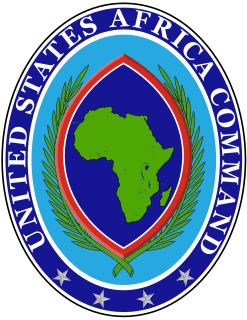
The United States Africa Command, is one of the eleven unified combatant commands of the United States Department of Defense, headquartered at Kelley Barracks, Stuttgart, Germany. It is responsible for U.S. military operations, including fighting regional conflicts and maintaining military relations with 53 African nations. Its area of responsibility covers all of Africa except Egypt, which is within the area of responsibility of the United States Central Command. U.S. AFRICOM headquarters operating budget was $276 million in fiscal year 2012.

The Oklahoma Military Department is an agency of the state of Oklahoma that serves as the administrative agency for all matters concerning the Oklahoma National Guard. Under the authority and direction of the Governor of Oklahoma as commander-in-chief, the agency is responsible for planning, establishing, and enforcing rules and procedures governing the administration, supply, and training of the Oklahoma National Guard, when not in the active service of the United States, the Oklahoma State Guard and the Oklahoma Unorganized Militia. The Department also maintains all state-owned, licensed or leased facilities, including Camp Gruber.

The Kansas–Armenia National Guard Partnership is one of 22 European partnerships that make-up the U.S. European Command State Partnership Program and one of 65 worldwide partnerships that make-up the National Guard State Partnership Program. The Republic of Armenia signed a bilateral affairs agreement with the U.S. Department of Defense and the state of Kansas in 2003 establishing the Kansas-Armenia State Partnership Program. Kansas Gov. Kathleen Sebelius subsequently signed a proclamation declaring June 18, 2004, as Kansas-Armenia Partnership Day.
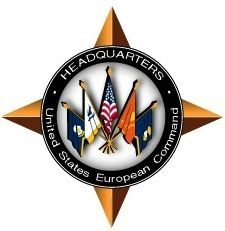
The United States European Command State Partnership Program, according to its own mission, is a National Guard program that "links U.S. states with designated partner countries to ... support the command’s security cooperation objectives." Currently, 22 Partnerships exist "with former Soviet, Yugoslav and Warsaw Pact countries in the EUCOM Area of Responsibility." Becoming independent on the dissolution of the Soviet Union on December 26, 1991, these countries shortly requested the advice and assistance of the United States in creating new self-defense forces.
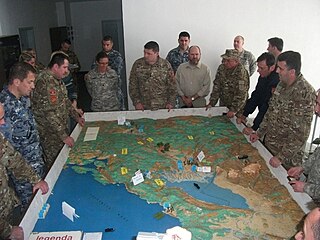
The Maine–Montenegro National Guard Partnership is one of 22 European partnerships that make up the U.S. European Command State Partnership Program and one of 65 worldwide partnerships that make-up the National Guard State Partnership Program. Montenegro signed a bilateral affairs agreement with the U.S. Department of Defense and the state of Maine in 2006 establishing the Maine-Montenegro State Partnership Program.

A Bilateral Affairs Officer is a United States Army or Air National Guard officer serving as a conduit between the state and a 'partner country' as part of the National Guard State Partnership Program. The position is considered a diplomatic level assignment.

The Tennessee–Bulgaria National Guard Partnership is one of 22 European partnerships that make up the U.S. European Command State Partnership Program and one of 74 worldwide partnerships that make up the National Guard State Partnership Program. The Republic of Bulgaria joined by signing a bilateral affairs agreement with the U.S. Department of Defense and the state of Tennessee in 1993. Since 2015 Bulgaria also contributes troops to the Resolute Support Mission as a member of NATO.

The Alabama–Romania National Guard Partnership is one of 22 European partnerships that make up the U.S. European Command State Partnership Program and one of 65 worldwide partnerships that make-up the National Guard State Partnership Program. The Republic of Romania signed a bilateral affairs agreement with the U.S. Department of Defense and the state of Alabama in July 1993 establishing the Alabama–Romania State Partnership Program. Since then, the ALNG has fostered a solid relationship and continues to be a viable enabler in building capacity in Romania.

The California–Ukraine National Guard Partnership is one of 22 European partnerships that make up the U.S. European Command State Partnership Program and one of 65 worldwide partnerships that make-up the National Guard State Partnership Program (SPP). The California-Ukraine SPP is one of the most important and progressive partnerships within European Command. Ukraine's size and strategic location make it one of the most influential countries in the region, thus making the SPP a key factor in assisting Ukraine as it develops it budding democracy.

The Colorado–Slovenia National Guard Partnership is one of 22 European partnerships that make up the U.S. European Command State Partnership Program and one of 65 worldwide partnerships that make-up the National Guard State Partnership Program.
The Illinois–Poland National Guard Partnership is one of 22 European partnerships that make up the U.S. European Command State Partnership Program and one of 65 worldwide partnerships that make-up the National Guard State Partnership Program. The relationship between the Illinois National Guard and the Republic of Poland is an enduring partnership that was established in 1993. The primary focus is split between support of ISAF Operational training and co-deployment, Professional Military Education, Transformation of the Forces, Crisis Management and Response, and Defense Support of Civil Authorities.

The Georgia–Georgia National Guard Partnership is one of 22 European partnerships that make up the U.S. European Command State Partnership Program and one of 65 worldwide partnerships that make-up the National Guard State Partnership Program. The Georgia National Guard has maintained a strong State Partnership program with the Republic of Georgia since 1994. Since then, Georgia has put itself on the path of acceptance into NATO, in large part due to the State Partnership Program.

The Iowa–Kosovo National Guard Partnership is one of 22 European partnerships that make-up the U.S. European Command State Partnership Program and one of 65 worldwide partnerships that make-up the National Guard State Partnership Program. The partnership was created on March 11, 2011 with the long-term goal of developing the Kosovo Security Force (KSF) and fostering mutually-beneficial interests across all levels of society. Establishing a strong relationship with the government of Kosovo, this partnership represents a critical step toward the reform development of Kosovo's security forces along Euro-Atlantic standards. The relationship lead to a sister state agreement.
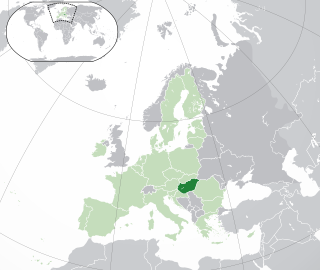
The Ohio–Hungary National Guard Partnership is one of 22 European partnerships that make-up the U.S. European Command State Partnership Program and one of 65 worldwide partnerships that make up the National Guard State Partnership Program. The country of Hungary signed a bilateral affairs agreement with the U.S. Department of Defense and the state of Ohio in 1993 establishing the Ohio-Hungary State Partnership program. There is a large population of Hungarians throughout Ohio, especially in Columbus, Cleveland, Dayton and Toledo. Since then, Ohio and Hungary have conducted over 150 SPP events in a host of security cooperation activities ranging from bilateral familiarizations, small unit exchanges, exercises, senior military and civic leader visits to deployments of Operational Mentoring and Liaison Teams (OMLT) in support of Operation Enduring Freedom.

The Ohio–Serbia National Guard Partnership is one of 22 European partnerships that make-up the U.S. European Command State Partnership Program and one of 65 worldwide partnerships that make-up the National Guard State Partnership Program. The country of Serbia signed a bilateral affairs agreement with the U.S. Department of Defense and the state of Ohio in 2006 establishing the Ohio-Serbian State Partnership program. With a substantial Serbian-American community in Cleveland it was a natural fit to create this partnership. Since then, Ohio and Serbia have conducted over 70 SPP events in a host of security cooperation activities ranging from bilateral familiarizations, small unit exchanges, exercises, senior military and civic leader visits to the potential development of future Medical Readiness Training Exercise (MEDRETE).
Initiated in 2013 by the 38th Chief of Staff of the Army, Raymond T. Odierno, regionally aligned forces (RAF) provide combatant commands (CCMDs), scalable and tailorable Army capabilities for all requirements, including operational missions, bilateral and multilateral military exercises and security cooperation activities. Army regional alignment is an organizing principle that improves the Army's ability to provide units and capabilities. Regional alignment provides focus and direction for unit training and preparation. RAFs are drawn from the Army Total Force, which includes active United States Army, the Army National Guard and the United States Army Reserve. Corps and divisions are aligned to ensure joint task force capability to every geographic combatant command (GCC). Through regional alignment, the Army maintains its war-fighting skills and complements these skills with language, regional expertise and cultural awareness training.

Linda L. Singh is a retired major general of the Maryland Army National Guard.

















